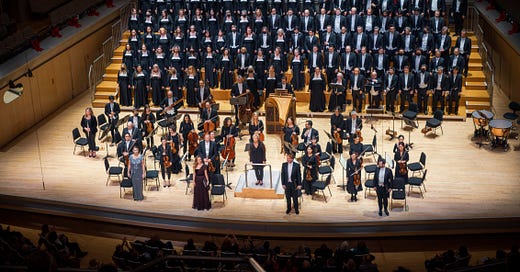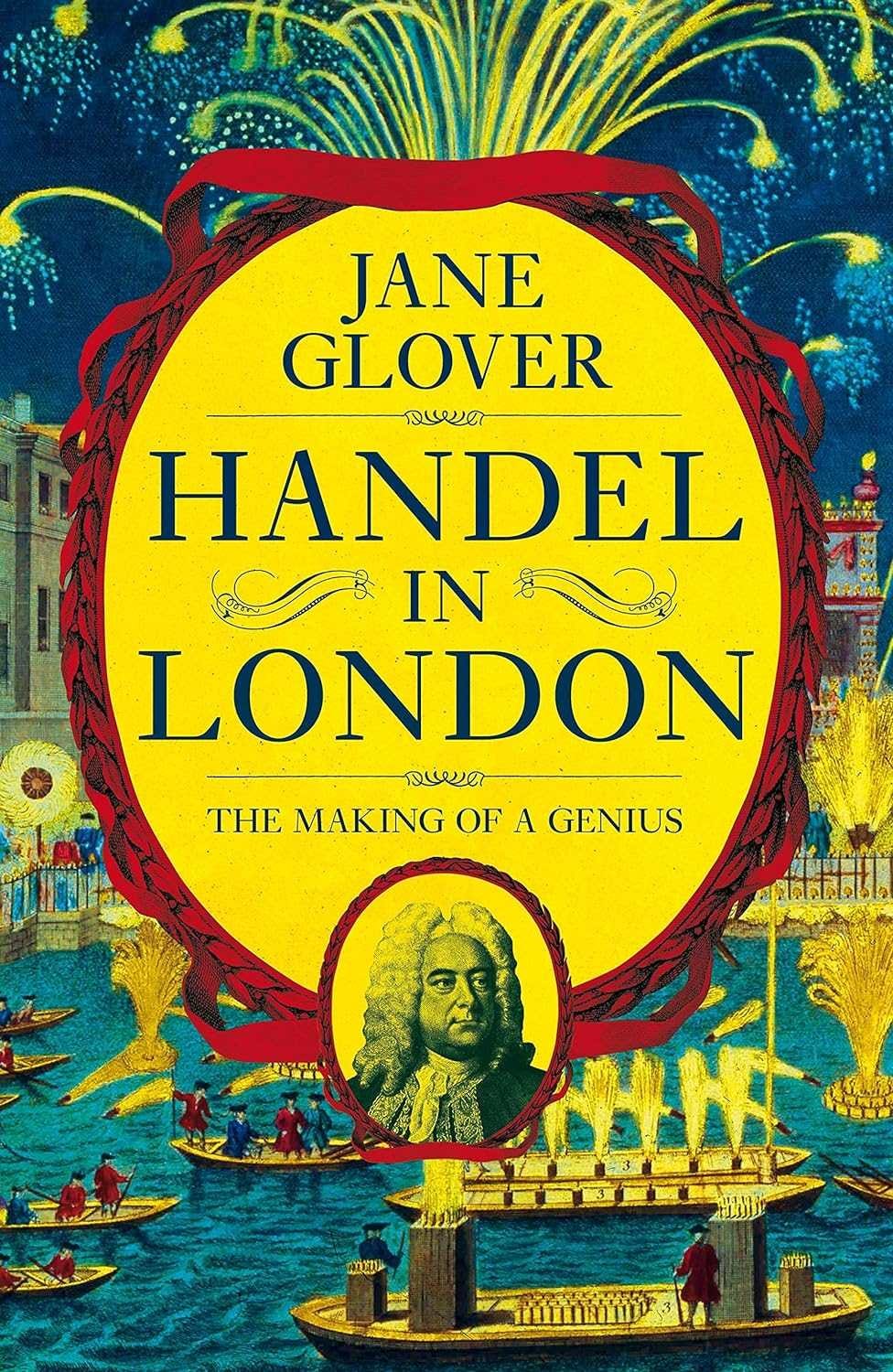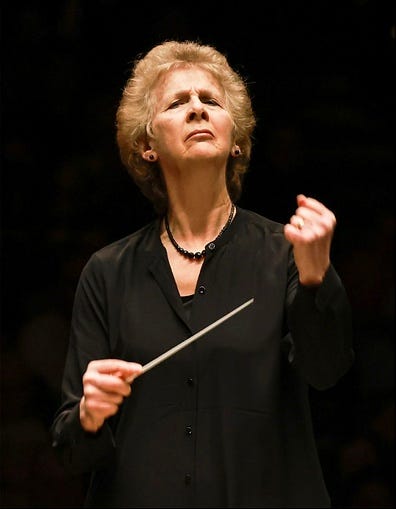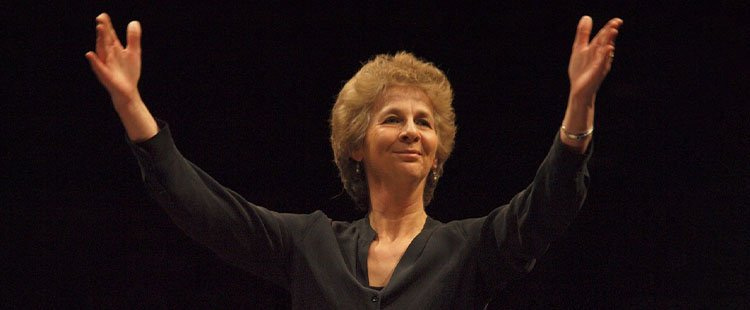Maestro is brilliant, but Tar is more about self-destruction than conducting
A Q&A with the pioneering conductor Jane Glover
The Primo subscribers will remember how much I enjoyed the TSO’s Messiah back in December, as well as that I interviewed Jane Glover, DBE, for the Wholenote magazine around that time. My profile is coming out in the February issue of the magazine as planned, but for the serious music lovers among you, here’s the director’s cut: the Q&A version.
LP: You conducted Messiah without the score last night. Obviously, you know it inside out… I’ve read somewhere that you’ve conducted it 100 times?
JG: More. I treasure the tote bag given to me in 2018 by the Cleveland Orchestra, Jane Glover conducts her 100th performance of Messiah. This is actually my first Messiah since before the pandemic. But I think I'm probably at about 112.
How much rehearsal time do you get as a visiting conductor with the TSO musicians?
There’s barely time to play through things. There’s time to say a few general things. I did have a separate session with the choir and that was lovely. They carry so much. I just wanted to persuade them to help me tell stories. Telling two stories–Nativity and Crucifixion–and then reflecting on it. I hope that came over.
We started with more string players. I actually reduced it down to 8-6-4-4-2 because that is plenty, even for a choir of that size. And of course in the arias it can get heavy. You can make people play lightly, but it’s still a bigger sound than one needs for these very intimate arias. Our goal was the variations in the dynamics. For example, in Amen, I’ll take it right down and start it pianissimo and let it build and build and build.
You start your book Handel in London with the Messiah. You say there that you first heard it when you were 9 and that it made you want to become a musician?
Yes, I've heard my first Messiah in Lincoln Cathedral. I was blown away by it. It wasn’t the big stuff, the Hallelujah chorus, the Amen or “The Trumpet Shall Sound”; the thing that really got me was “I Know That My Redeemer Liveth.”
Were you Christian, are you a Christian, did that make a difference?
Yes and yes, but I don't think it matters. I say this when I do Bach’s Passions. I say to choirs, you don’t have to believe this, what you have to do is convince people that you do. Just tell the story. The story is great.
And the language is so beautiful in Handel’s Messiah. The King James Bible.
What a brilliant job Charles Jennens did! Selecting those passages. Brilliant, brilliant job. He also wrote the librettos for Handel’s two greatest oratorios, Saul and Belshazzar. He knew his way around the Old Testament. It was a curious relationship between them but boy was it productive.
Why has the work endured for so long and why does it have such great appeal?
Well, It’s one show stopper after another, isn’t it. There is not a bad number in it. We had to make cuts, and most orchestras do, but I like doing the entire thing as well… though then everyone will be waiting for their favourite parts. “He Was Despised” is for me the heart of it. At the beginning of part two. Coming back after the interval, we’ve done the Christmas part, and “His Yoke is Easy”, and everybody’s had a drink and a mince pie but then we have to say - actually. There’s something else. Behold the Lamb of God. It takes us to the vision of somebody being despised and rejected, and then you get the appalling scene of the crowd baying and taunting him. It gets dark. But then it turns around. “Lift Up Your Heads”, and back we go to “Hallelujah”
The oratorio wasn’t immediately loved when it opened in London?
What they didn’t like was when it was performed in a theatre. That’s the reason that it didn’t go down well when he first did it in London [after Dublin]. Handel did it during Lent; his oratorios would be Lenten substitute for opera. Doing Old Testament stories is one thing but actually to have a story of the Messiah in a theatre? That annoyed the bishops, and the bishops influenced the public, and it didn’t go down well. It was only when he started doing it for his charity - The Foundling Hospital - that the audience mood changed. He did it there every year in the chapel to which he had himself contributed the organ. Then it became something to do in time of Lent - for a good cause - to remind us of our mortality etc. And it became a fixture and it got more and more popular and after Handel’s death they got bigger and bigger. Messiah largely accounts for the whole of the English oratorio tradition. The other oratorios of his slipped into obscurity for some time.
I’ve done the Messiahs of all sorts and all sizes; I once had a choir of 400-something in Sydney. I really enjoyed the version that Mozart did. It came out about 50 years after Handel wrote it, which goes to show that by then Handel’s version was out of fashion. Mozart re-orchestrated it with enormous respect and quite a lot of fun. I must say I love doing the Mozart version. It’s one genius seen through the eyes of another.
What is different in Mozart’s version? We don’t hear it very frequently.
And it’s a pity. He added horns and flutes and composed through some underwritten parts. He just modernizes the orchestra. “The Trumpet Shall Sound” is actually on a horn. Which is wacky. And there are clarinets - first time I ever did the Mozart version, I jumped in at the last minute for an ailing Charles Mackerras. I got the call on the morning of the concert so I got to do the final rehearsal and then the concert in the evening. I spent the whole afternoon chuckling with joy at what he’d done. It was just so witty.
Do you care if the Messiah is played on period or modern instruments?
No is the short answer. Modern orchestras like the TSO have musicians who also understand the baroque style. Didn’t they make a beautiful sound last night? They didn’t sound like Rachmaninov at all - or Shostakovich. We talked in the first five minutes about vibrato and whether to use it and I'm not Roger Norrington who says never ever ever, because it is very much an expressive device. I told the orchestra that and they all knew what I meant. And I love them for that. Period instruments and the historically informed performance (HIP) have been with us for quite a long time now, and everybody’s been affected by it. Modern players grew up listening to these really great orchestras like the Orchestra of the Age of Enlightenment, or the Handel & Haydn Society… so many of them are fabulous. When it all started the HIP orchestras weren’t terribly good, everybody mocked them for only playing in first position and out of tune. But now we have some stunning players in the HIP world.
You are the Music Director of the Music of the Baroque Orchestra in Chicago?
Yes but we’re modern. That is the case in point. I’ve been there for 20 years and I love them dearly; they’re my musical family. They are the best players in Chicago, many of them in the Chicago Symphony Orchestra, many in the Lyric Opera, and they come to us to play our repertory which is basically the eighteenth century, because they love it. It's a tremendous commitment for them; we’re often the third session in their day. Scheduling is quite a nightmare for our team: we have to navigate musicians’ schedules. Half the orchestra has been playing Bruckner with Muti and the other Wagner with Andrew Davis, and they come to us and play Bach and Handel. And it takes us… five minutes to find our sound?
There are a lot of musicians who are in both worlds?
Yes. Some of them even hold the modern bow differently; some of the TSO musicians did that. I love it when they do that. Because it alters what you do with the stroke, and the sound you produce.
Your doctorate was about Cavalli, Monteverdi, and the seventeenth-century Venetian opera. Just as the HIP movement was taking off in England and on the Continent, no? But you don’t perform Monteverdi & comp. as much?
I have. I made my own performing editions of all three Monteverdi operas. But I do all kinds of things now. And I like to do contemporary music too. There is a bit of a lacuna - I don’t do much nineteenth-century music, it has to be said. Nobody will ever ask me to do Wagner – except I did Siegfried once, which I loved doing; jolly difficult. I've come to Wagner quite late but I absolutely love it now, can’t get enough of it. And probably no one will ask me to do a Verdi opera. When I was at the Royal Academy as the director of opera, I did a lot of different things. I did get to do Onegin and various acts of Bohème and I’ve done Gianni Schicchi but it’s not really what I'm known for. The eighteenth century is where I live.
The other person who’s terribly important to me is Benjamin Britten.
I was listening to your Desert Island Discs last night; you chose one of the Sea Interludes from Britten’s Peter Grimes. And you chose Abschied. Have you conducted Mahler much?
A little, yes. But full Mahler not as much. I’ve done those Schoenberg reductions. Which are so good. But when I did Das Lied von der Erde I absolutely learned it on the big score as well as the small score. So I'm absolutely ready if anybody wants me to do it! I’ve actually done the Rückert Lieder with a full orchestra, with Sarah Connolly, no less. So yes I’ve done Mahler, and I’ve done a bit of Strauss too. Rosenkavalier is one of the operas that I hope to do before I pack away my baton. And I do think Rosenkavalier ought to be conducted by a woman!
Agreed. Another thing you said in the DID - Virginia Woolf's letters were your choice of the book to take to the Desert Island. Tell me about your love of Virginia Woolf.
What a writer. I mean, really what a writer. Funnily enough I have the Shakespeare in Bloomsbury book upstairs that I've been reading, by Marjorie Garber. The Bloomsbury group worshipped him. I just got it and brought it with me, it’s a fabulous companion on the road.
Do you prefer Woolf’s fiction or letters?
All of it, really. In letters and diaries you really get to know her, and the novels and the essays are so brilliant. I often come back to her. I remember having a 5-hour stopover at an airport during which I quietly sat in a corner and read Mrs Dalloway again. Possibly one of my favourite novels.
Not The Waves?
With her novels, my favourite is always the last one I’ve read. It’s like when people ask you what's your favourite Mozart opera. Well, the one I'm doing now.
Have you seen The Hours, the opera?
No, though I want to. It was performed just last year at the Met. With Joyce [DiDonato] as Virginia Woolf. I’ll tell you what I did see recently. Maestro.
What did you think?
Brilliant.
We had two Hollywood films about conducting recently: Tar and Maestro. How did you find Tar?
I put off seeing it for a long long time. Because everybody was asking me about it all the time. And then I was on a flight…
Marin Alsop complained about it.
I really understand where she’s coming from, I really sympathize with her.
OK but Tar had to be an art monster. She couldn’t have been a goody. There’d be no story.
The thing is, it is not a story about my profession. It’s a story of self-destruction. And in that sense it was a brilliant movie. And I worship Cate Blanchett anyway, and it was a stonking performance by her. But I had to say, there was not much of my profession that I recognized. And I don't know any conductors of any sex any more who treat orchestral musicians like that. Nor do I know any conductors who travel in private planes, by the way. And every time my plane is cancelled or I have to wait for a missing suitcase, I think, Well this never happened to Tar.
Tar is a sort of the Karajan generation of conductors - moved to our time.
Yes. And the Bernstein movie is not a biopic either. It's a portrait of a marriage. And in that sense - they’re both brilliant by the way, Mulligan and Cooper. Cooper was extraordinary. The courage to tackle such a role, and what he did with Mahler 2 in the Ely Cathedral… coached by Yannick Nézet-Séguin, one of the best-known Canadian musicians today. I thought it was a really brilliant film. It was a very warm movie, had a great deal of heart. And Carey Mulligan can show you what she’s thinking without doing anything.
So the conducting passes the credibility test?
It did, more than Cate Blanchett, to be honest. Though she made a good fist of it.
Do you get tired of the women-in-conducting question? You WERE one of the very first. Now everyone wants to mix it up and invite at least one woman per season.
Yes, it’s changed radically in the last 5 years even. 10 certainly. It’s lovely. The playing field is still not level but it’s much less steep than it was. I love it that everywhere I go there seem to be women who are assisting or getting the job. There are two on this program that I'm assisting this week [Tapestry Opera program Women in Musical Leadership]. We have a program at the RAM to which I’m still attached as a visiting professor, which is called the Glover-Edwards Program after me and Sian Edwards. We’re the oldest basically in the UK and she runs the conducting department at the Academy now and this is a program just for women. They come from all over and they meet 3 or 4 times a year for intensive weekends with us and it’s great.
II
I wanted to ask you about your latest book, Mozart in Italy.
That was my Covid project. But after the Handel book, which nearly killed me, I said no more books - he lived so long and wrote so much music, and just after I signed the book contract I became head of opera at the RAM in addition to running around the world conducting. That’s when I discovered that you can do two jobs at once but not three. And I kept missing deadlines. Amongst the ecstasy of dealing with incredible material [of Handel’s operas and oratorios]. When it was done, I was sure I was never going to do another book. But then the planet shut down. I thought, if I didn’t engage my brain, I was going to lose it.
Having written one book on Mozart [Mozart’s Women: His Family, His Friends, His Music], I have all these books and resources at home… and then there’s the internet. Which is brilliant. I can sit in my study at home, and access the eighteenth-century documents in the British Library.
In between the lockdowns, I wanted to trace the routes that Mozart and his father had taken as they set out from Salzburg through the Tirol into northern Italy into Verona and Milan. They actually went down as far as Naples. All the time he was being steeped in opera - that’s when he learned how to write it. Between the ages of 13 and 16 when anybody is incredibly impressionable and changing a lot, hormones are happening, he discovered girls in Venice in a big big way. He loved Italy, it taught him a great deal. This is the bottom line: 4 of the greatest Italian operas of the eighteenth century are written by Mozart.
How did Mozart and Da Ponte come across each other?
They were both in Vienna at the same time, but they were both outsiders, interestingly. Da Ponte was a brilliant poet who had the approval of the court poet Metastasio. He was writing operas for everybody and eventually he started writing librettos for Mozart. The operas that they did together were completely different from anything that was written before. They were modern. The Marriage of Figaro was of course the rewrite of the Beaumarchais play which had been banned in Paris and then banned in Vienna but it was Da Ponte’s brilliance to convince the theatrical authorities in Vienna that “opera was just music”, it doesn’t count as being subversive or political.
So the opera itself was never banned?
No. And then there’s his own version of the Don Juan story which was incredibly modern. And the third is Così fan tutte, which is about society. Basically all of that was about picking up the mirror and saying to the audience, this is about you.
Which is your favourite of the Mozart-Da Ponte collabs?
It is terribly hard to say, but if you really forced me I would say Cosi because I think musically it moves me to the greatest heights…
OK but the story is a bit insane.
It looks like it’s a silly story but actually it’s not. It reveals so much about human nature and about how people treat each other. And how people are vulnerable and how people are cruel and how they react to each other. It’s an incredibly subtle piece of theatre. And at the end of that piece, all six people, their lives have been changed. As they have in Don Giovanni of course, as they have in Figaro. They are billed as comedies, all of them, but they are not. They are an incredibly serious statement on the human condition. And I use this word not lightly at all: they are Shakespearean.
You have two Don Giovannis coming up - in Houston and Cincinnati.
I do! It’s really hard technically - the act 1 finale, for example, with three orchestras playing in different times, just keeping that together. And the finale… just gets tougher and tougher as we approach the damnation scene. And meanwhile you’ve got a lot of balls to keep in the air. In a way it’s Donna Anna’s story as much as his.
Lately there’s been a lot of talk in certain musical bien-pensant circles on whether Don Giovanni is an opera about a rapist. And why do such an opera at all.
It’s if not about rape, it certainly is about murder - and these don’t happen in Cosi and Figaro…
They all like him, though. Donna Elvira is obsessed; Zerlina goes with him after the duet; Donna Anna likes him till the end.
She let him in and she regretted it. As a result of that her father was killed. That’s her issue. That’s why she screams her way through the opera and that’s why she’s saying to the dear old Ottavio at the end, just give me a year, let me sort myself out. We know they’re not gonna get married.
Vocally it is so challenging, the baritone has to have all that honey and seduction in the voice but also the manic thing of being an awful human being. And the only aria that he gets is the Champagne Aria, which is all arpeggio and a lot of text and nowhere to breathe. It’s so challenging but so rewarding. I never get complacent about any Mozart… though I certainly do Figaro from memory and Entführung aus dem Serail too. But I play the recits on harpsichord. Or fortepiano. I’ll see if I can have a fortepiano for my next Don Giovanni.
Mozart’s teen operas are now being performed left and right. Mitridate…Lucio Silla…
Milan was the operatic centre of the world when the Mozarts visited. The precursor to La Scala was Il Teatro Regio Ducale, which burned down, as many theatres back then did. Milan, Venice and Naples, they were the three operatic centres. Although every small town had an opera house, and there were two in Naples… Italy was also producing the best singers and they were having big careers and being paid and treated like rock stars. When Mozart, this 14-year-old foreign boy, got the commission to open the season in Milan - with Mitridate - the divos were told, you don’t have to sing the music by this kid, there was a very good version done in Turin last year so you can use the arias from that. As soon as the divos met Mozart and saw what he could do, they immediately agreed to sing anything he gave them.
There was so much recycling and substituting happening. Handel did that a lot.
Yes but that was to stop quite soon. What I learned doing this project - I’ve done Lucio Silla, never Mitridate - is that his teen opus is full of incredible music. And he had extraordinary singers; he wouldn’t have written those arias for them otherwise. He wouldn’t have written Queen of the Night arias for his sister-in-law if she wasn’t able to sing it. He wrote for the singers that were available to him.
He was longing to do opera after Italy but there was no opera house in Salzburg. So every opportunity that he could, he seized - even the opportunity to write La Finta Giardiniera for Munich, where it was played three times only, several weeks apart. It was a comic opera, shorter arias, not a bit like what he was experiencing in Italy. And it wasn’t until he got to Vienna and the Emperor Joseph II’s court - whose siblings by the way were all married to various people in power in Italy, a lot of Italy was still Habsburg territory - and it wasn’t until he met the great Italian singers and more to the point the great Da Ponte that he employed his Italian experience to the fullest.
Also, Idomeneo, I think is one of the greatest opera seria ever written.
What about La Clemenza di Tito? The mezzo trouser arias, which used to be the castrati showpieces, are terrific.
Clemenza is not nearly as good - some fantastic music in it but the recitatives were terrible, he didn’t write them. At the same time he was writing The Magic Flute, now that is very much looking forward. The Magic Flute has no peer; it's such a mishmash of theatrical conventions - it’s crazy. Yet brilliant. How does he get away with it?
The Seraglio is incredible too. David McVicar once said that the hardest thing to get the singers in Figaro and Seraglio to understand is the master-servant relation.
Yes. One of my favourite productions of Figaro I worked in is by Janet Suzman, now Dame Janet, a Shakespearean actor. She set it in Cuba before the revolution. It was very much a society of masters and servants, and the rumblings of a revolution. In her production in the beginning of act 2 we see the countess packing her suitcase as if she’s ready to leave and Susanna asking her to stay. And at the end of act 4, when the Count sings “Contessa perdono” she takes the suitcase - against the libretto - and leaves.
Toronto, December 18, 2023






